Climate change and the bioeconomy
By Daniel Woodhams, Alessandro Clo, and Marta Pagnani
Introduction:
Today we discussed Climate Change Adaptation and the bioeconomy. This day was representative of most ICRPS days where in a relatively short amount of time we developed a broad grasp of cutting edge policy solutions.
Climate Change Adaptation
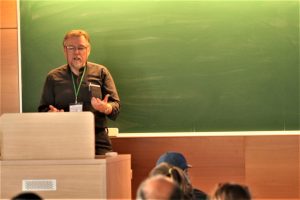
John Devlin discusses Food, Energy, Water, Climate nexus
The morning session framed the day’s programming with several theoretical models of evaluating energy and development beyond economics. Professor Devlin’s lecture introduced several interesting ideas, notably the philosophy of Polanyi, who advocated examining economics within the context of society, and society within the scope of the environment. This prism was complimentary to the Water, Energy, Food Triangle that was later outlined and provided a nice background for the afternoon session on the bioeconomy.
Professor Zabawa’s lecture was very iconoclastic and refreshing. It outlined Environmental Justice and offered several interesting axioms. It was provocative, because it challenged the contemporary view that Academia should be very neutral and not ask normative questions.
The Bioeconomy
The afternoon lectures illustrated the exciting possibilities and achievements in developing a bioeconomy as an alternative to a fossil economy. It was very inspirational because many great, useful and implemented options were discussed, and very strong arguments were made for the adoption of bioenergy.
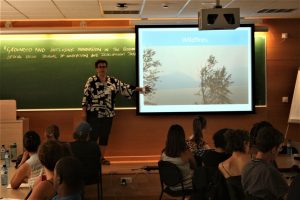
Tara Clapp discusses community water management in BC, Canada
Professor Clapp’s lecture discussed community strategies in reacting against policy, something that was interesting given Professor Zabawa’s earlier lecture, and Dr. Steele’s lecture on community governance last week.
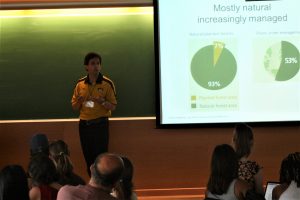
Francisco Aguilar discusses forestry
Professor Aguilar had a very nice lecture. Last week many people told us that the forest in Cataluña should be managed, which is very surprising to city people who often think that the more trees the better. Professor Aguilar explained very carefully why this was rational, and talked about cases like Portugal.
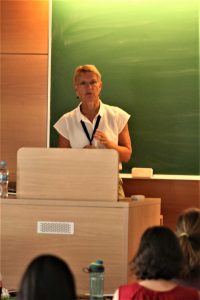
Karen Refsgaard discusses the bioeconomy
Professors John Bryden and Karen Refsgaard presented many useful models and policies for forest-based bioenergy, which helped us understand practical options in developing policy in our home countries. The quintuple helix system is probably one of the best models for painting policy that we have ever heard.
A wonderful presentation was given by Professor
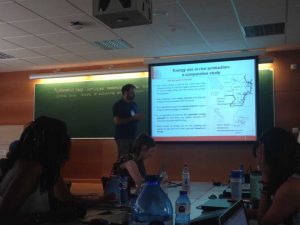
Matteo Vittuari presents on energy in food production
Vittuari, who organized a very constructive discussion and asked many pressing questions. He had a very good comparative presentation that should be a role model for future ICRPS lectures. When we talked to our colleagues afterwards, many were impressed by this great research coming from the University of Bologna. We hope that many people will learn from Professor Vittuari and consider coming to Bologna. Professor Vittuari is very typical of the University of Bologna and if you liked his lecture you should think about learning more great ideas there.
Conclusions
We feel that it is important to use bioenergy. It’s a very important solution to many environmental problems, and issues like food waste can be addressed meaningfully through diversification in this industry.
